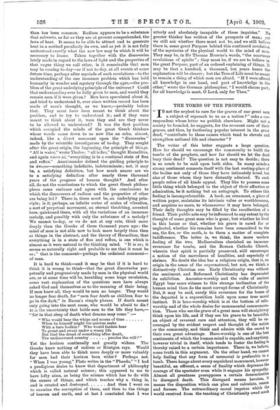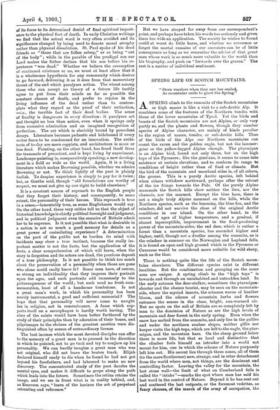THE TOMBS OF THE PROPHETS.
" IS not the neglect to care for the graves of our great men a subject of reproach to us as a nation ?" asks a cor- respondent whose letter we publish elsewhere. Might not a society be founded, he suggests, for the reverent care of their graves, and thus, by furthering popular interest in the great dead, "contribute to those causes which tend to elevate and strengthen national life and character" ?
The writer of this letter suggests a large question. How far should we encourage the community to build the tombs of the prophets, and how far should we let the dead bury their dead? The question is not easy to decide; there is so much to be said upon both sides. In many minds a strong sentiment connects itself with the last resting-place of the bodies not only of those they have intimately loved, but also of those whom they have distantly admired. To such people relics of all kinds appeal. They like to possess some little thing which belonged to the object of their affection or admiration, be it nothing but an autograph. To others this feeling is incomprehensible. A book, an ornament, a piece of written paper, maintains its intrinsic value or worthlessness, and acquires no more, to whomsoever it may have belonged. Their daily thoughts may be filled by the recollection of a friend. Their public acts may be influenced to any extent by the thought of some great man who is gone; but whether he lived in this house or that, whether his grave is cared for or neglected, whether his remains have been committed to the sea, the fire, or the earth, is to them a matter of complete indifference. The latter is, we think, the more modern feeling of the two. Mediaevalism cherished an immense reverence for tombs, and the Roman Catholic Church, wherein that spirit is partially preserved, still encourages a notion of the sacredness of localities, and especially of shrines. No doubt the idea has a religious origin, that is, an origin in the sense of the supernatural, but not, we think, a distinctively Christian one. Early Christianity was without the sentiment, and Reformed Christianity has deprecated its exhibition. Ancestor-worship and the cults of ancient Egypt bear more witness to this strange inclination of the human mind than do the most corrupt forms of Christianity. But, it may be said, surely this reverence for the bones of the departed is a superstition built upon some true moral instinct. It is hero-worship which is at the bottom of relic- worship and of the whole desire for monumental commemora- tion. Those who see the grave of a great man will straightway think upon his life, and if they see his grave to be beautiful, an object of reverent care and attention, they will be en- couraged by the evident respect and thought of the nation or the community, and think and admire with the crowd to their own great advantage. Hero-worship is one of the best sentiments of which the human mind is capable, and anythinF, however trivial in itself, which tends to foster the feelings thereby raised to a certain importance. There is, we believe, some truth in this argument. On the other hand, we cannot help feeling that any form of memorial is preferable to a tomb. There hangs about every sepulchral monument, however beautiful, an effluent, a sense of finality which depresses the courage of the spectator even while it engages his spina.? Y. Almost all greatness presupposes a certain determination to disregard death. This disregard means heroism, It means the disposition which can plan and calculate, reason and foresee. The extraordinary moral impetus which the world received from the teaching of Christianity owed mach of its force to its determined denial of final spiritual import- ance to the physical fact of death. La early Christian writings we find that the actual word is very often avoided and its significance changed by being used to denote moral atrophy rather than physical dissolution. St. Paul spoke of his dead friends as "those that are fallen asleep," or as being "out of the body " ; while in the parable of the prodigal son our Lord makes the father declare that his son before his re- pentance "was dead." Whether we believe the assumption of continued existence or no, we must at least allow that it is a wholesome hypothesis for any community which desires to go forward, delivering it as it does from that momentary threat of the end which paralyses action. The wisest among those who can accept no theory of a future life tacitly agree to put from their minds as far as possible the constant chance of death, and prefer to rejoice in the living influence of the dead rather than to contem- plate what they regard as the proof of their extinction, --i.e., the terrible fact of their dead bodies. The sense of finality is dangerous in every direction: it paralyses art and thought no less than action, even when it springs only from excessive admiration and an imagined recognition of perfection. The art which is slavishly bound by precedent decays. Literature becomes pedantic and hidebound if every writer fears to be condemned for an innovation. The archi- tects of to-day are mere copyists, and. architecture is more or less dead. Painting, on the other hand, has freed itself from the trammels of precedent, and is kept living by experiment. Landscape-painting is, comparatively speaking, a new develop- ment in a field as wide as the world. Again, it is a living literature which makes Browning possible, whether we admire Browning or not. To think lightly of the past is plainly foolish. To despise experience is simply to pay for it twice; but, as Goethe said, though "old foundations are worthy of respect, we must not give up our right to build elsewhere."
It is a constant source of reproach to the English people that they forget their history, and consequently, to some extent, the personality of their heroes. This reproach is true in a sense,—lamentably true, as some Englishmen would say. On the other hand, these very critics tell us that the object of historical knowledge is chiefly political foresight and judgment, and in political judgment even the enemies of Britain admit her to be supreme. Is it not possible that what is desirable in a nation is not so much a good memory for details as a great power of assimilating experience ? A determination on the part of the public not to burden its mind with incidents may show a true instinct, because the really im- portant matter is not the facts, but the application of the facts, a clear comprehension of which will leave, when the story is forgotten and its actors are dead, the precious deposit of a true philosophy. Is it not possible to think too much about the preservation of a personality when those are gone who alone could really know it? Some men have, of course, so strong an individuality that they impress their portrait upon the ages, and such portraits add immensely to the picturesqueness of the world ; but such need no fresh com- memoration, least of all a handsome tombstone. Is not a great man's work, in which his personality has been merely instrumental, a good and sufficient memorial ? The hope that that personality will never come to naught lies in religion, not in remembrance. A fame which sup- ports itself on a sarcophagus is hardly worth having. The aims of the saints would have been better furthered by the study of their principles than by adoration of their bones, and pilgrimages to the shrines of the greatest ascetics were dis- tinguished often by scenes of extraordinary license.
The best incense which the most devoted disciples can offer to the memory of a great man is to proceed in the direction in which he pointed, not to go back and try to conjure up his personality. We can hardly imagine a great man who was not original, who did not leave the beaten track. Elijah declared himself ready to die when he found he had not got beyond his forefathers, and had laboured to make no new discovery. The concentrated study of the past dazzles the mental eyes, and makes it difficult to grope along the path which leads into the future. Sometimes the retina retains the image, and we see in front what is in reality behind, and, as Emerson says, "learn of the horizon the art of perpetual retreating and reference."
But we have strayed far away from our correspondent's point, and perhaps have taken his words too seriously and given them too wide an application. The society he wishes to found could at worst do little harm, and whether we reverence or forget the mortal remains of our ancestors can be of little consequence so long as we remember the advice of that great man whose work is so much more valuable to the world than his biography, and push on "forwards over the graves." The rest is a matter of individual sentiment.











































 Previous page
Previous page